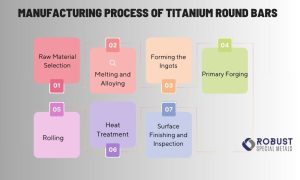Flanges are important pieces of equipment used to connect pipes, valves, and other ensuring secure leak-free and secure connections.In this blog we shall discuss what a flange is, it’s a mechanical component through which two systems can be connected usually sealed by a gasket. Flanges come in many forms, such as weld neck, slip-on, blind and threaded, each being meant for different uses. These flanges have extensive uses in oil and gas, chemical plants, water treatment, and HVAC systems. The benefits of using flanges are simple assembly and maintenance, prevention of leaks, high pressure and temperature resistance, and flexibility in design.These characteristics make flanges important in most industrial systems for safety and efficiency.
What is a Flange?
A Flange is a mechanical piece that is utilized to connect two objects, most commonly pipes, valves or other equipment, to form a secure, leak-free connection. Flanges are usually circular plates with holes for them to be bolted onto another flange, pipe, or equipment. The bolted connection is most often sealed using a gasket to ensure leak prevention and pressure retention.
Flanges are available in different shapes and sizes, depending on the nature of the application, pressure rating and material specifications. The structure of a flange ensures that the two joined components withstand the forces acting on them without any danger of separation or leakage.
Types of Flanges
There are several types of flanges, each serving a specific purpose depending on the application:
- Weld Neck Flanges
These are typically used in high-pressure applications and are welded to the pipe. The long neck of the flange provides a smooth transition and helps minimize stress on the pipe. - Slip-On Flanges
These flanges slip over the pipe and are welded both inside and outside to ensure a secure connection. They are easier to install and are suitable for low-pressure applications. - Blind Flanges
Used to seal the end of a pipe or a valve, blind flanges are solid and do not have a hole in the center. They are primarily used when a pipeline needs to be shut off temporarily or permanently. - Threaded Flanges
These flanges have internal threads that allow them to be screwed onto a pipe, making them useful for applications where welding is not possible. - Lap Joint Flanges
These flanges are often used when the piping system needs to be disassembled frequently. The flange is mounted to the pipe, and a loose backing flange is used to secure it. - Socket Weld Flanges
Typically used in high-pressure and small-bore pipe applications, socket weld flanges are designed to fit over the pipe and are welded into place.
Applications of Flanges
Flanges are versatile and are used in a wide variety of industries. Below are some of the most common applications of flanges:
- Piping Systems
One of the most widespread application of flanges is in piping system construction. Flanges offer a secure way of connecting pipes, valves, pumps and other equipment so that fluids or gases can be moved efficiently and safely. In piping systems, flanges are employed to create a tight seal to avoid leaks that may cause safety issues or system inefficiencies. - Oil and Gas Industry
Flanges are crucial within the oil and gas sector where high-temperature, high-pressure conditions prevail. Flanges appear in pipelines, refineries and offshore oil rigs, as they make safe and secure connections between pipes, valves, and other machinery possible. - Chemical Plants
The chemical industry is completely dependent on flanges to connect pipes that handle harmful or corrosive chemicals. Flanges made of corrosion-resistant materials like stainless steel or other alloys are usually applied to keep the pipes and vessels intact and avoid leaks that can be harmful to workers or to the environment. - Water Treatment Plants
Flanges are also used in water treatment plants to provide close, leakage-free connections between other equipment and pipes. The plants usually handle high-pressure water systems, and flanges provide a guarantee that the systems are leak-proof against the pressure without any safety risk. - HVAC Systems
In heating, ventilation and air conditioning (HVAC) equipment, flanges are utilized to connect ductwork, ventilation piping and other equipment. They ensure a safe, air-tight connection, and allow for easy maintenance and system modifications. - Automotive and Aerospace
Both in automotive and aerospace sectors, flanges are utilized across a range of mission-critical applications, like exhaust systems, fuel lines and hydraulic systems. These have to withstand temperature and pressure in high conditions without compromising on reliability and safety.
Advantages of Using Flanges
- Ease of Assembly and Maintenance
Flanges make it easier to assemble and disassemble piping systems for maintenance or inspection. This ease of use is critical in industries that require frequent maintenance or modifications. - Leak Prevention
Flanges, when paired with gaskets, produce snug, solid seals that exclude leaks.This is highly significant in companies where leakage of fluids or gas can lead to expensive loss or hazard. - High Pressure and Temperature Tolerance
Flanges are designed to withstand high pressures and temperatures making them suitable for use in demanding environments such as oil and gas pipelines or chemical processing plants. - Flexibility in Design
Flanges are available in a range of shapes, sizes, and materials, allowing design flexibility to suit particular application needs. From large industrial equipment to small specialized gear, there is a type of flange that will suit your application.
Conclusion
Flanges play an integral role in many industries by providing reliable, secure connections between components. Whether used in piping systems, chemical plants, or HVAC systems, flanges ensure that operations run smoothly and safely. Their versatility and durability make them indispensable in engineering and construction, and their ability to prevent leaks and withstand high pressure and temperature conditions only adds to their importance.
By understanding the various types and uses of flanges, you can appreciate the complexity and efficiency of modern piping systems and industrial applications. Whether you’re working in construction, manufacturing, or any other industry, flanges are an essential part of ensuring safety, reliability, and smooth operation.




